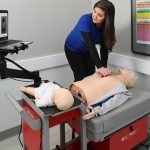The end of the calendar year is often a busy time for hospital workers. With admissions increasing during flu season, patients maximizing their insurance benefits before they reset, and providers often taking extended vacations, it's hard to have a moment just to breathe. And it's also a time when many professionals have to start preparing for certification and license renewals.
All in all, there's a lot going on. You can't control the volume of patients or daily workflow, but you can streamline your year-end professional to-do list. Here are some considerations to help you get things in order and checked off for the year.
Review Continuing Education Requirements
Whether you need to recertify or renew your license this year or not, most healthcare staff and providers need to have some amount of continuing education. December is a good time to reflect on what you've already completed. January is a good time to look ahead to how many credits you need this year, what tests you may need to study for, and what courses you would like to take.
It's also time to consider new skills or job growth for the year and map out what continuing education for those skills will be required. Evaluate what education requirements you can meet in the coming year to prepare for additional certifications or advanced licenses.
The demands of additional training can also bring considerable costs. Make sure to look up and apply for financial support during this time as well.
Prepare for Certification and License Renewals
Nursing licenses expire every two years, but the time of year varies by state. For some nurses, renewal comes at the end of January. Some providers, such as nurse practitioners, also have national licensure to maintain as well. The start of the year is a good time to make sure all paperwork is in order and that you have documentation for continuing education.
Certifications also may expire at the end or start of the year, and will require continuing education or recertification exams. The end of the year is a good time to evaluate budgets to cover the costs of exams or licensure to be prepared at the start of the year.
Squeeze in Some Training
Hospital workers may also have requirements for training, such as CPR certification, which tends to expire at the end of the year. The Resuscitation Quality Improvement (RQI) Program features high-frequency, low-dose training to keep skills fresh throughout the year. Learners can do short, quarterly trainings that easily fit into the work schedule. Much of the learning happens online, with hands-on practice at kiosks, and you earn eCredentials for completion.
Quarterly training lets learners complete the training on their own time and reduces some stress of having to schedule an intensive off-site CPR course. Kiosks and online modules are available 24/7 and most sessions take about 30 to 45 minutes. For those looking for a two-year certification, RQI also has a digital program that gives learners more flexibility in completing their CPR training with a two-year eCard at the end. Check with your RQI administrator to see if your system has the RQI Program to keep your training updated.
Update Your Supplies
The end or start of the year is an ideal time to take a look at what you need to help you do your job. Maybe it's time for a new pair of shoes or scrubs. Check your stethoscope. Does it need new earpieces or diaphragm pieces? What other tools or replacements would make your job easier entering the new year?
Feel Prepared for the Year Ahead
Hospital workers encompass a range of professions, skills, and certification or licensure levels. Your needs heading into a new year can vary greatly, but the transition time is always a good opportunity to pause and reflect on career requirements, considerations for advancement, and basic necessities for work.
For almost all hospital staff who provide care to patients, CPR training is a requirement. The ease of completing an RQI program supports staff in continuing their roles and makes it easy for employers to stay abreast of who's up to date. By partnering with the American Heart Association, RQI content always represents the latest research and resuscitation standards.









